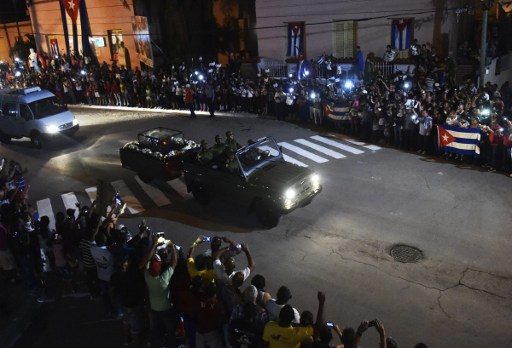SUMMARY
This is AI generated summarization, which may have errors. For context, always refer to the full article.

SANTIAGO DE CUBA, Cuba (3rd UPDATE) – Cuban President Raul Castro promised Saturday, December 3, to uphold his brother Fidel’s revolution at a massive, final rally in honor of the communist icon before his burial.
Tens of thousands of flag-waving supporters recited the pledge with Raul Castro at the Revolution Plaza of Santiago de Cuba, the cradle of Fidel’s guerrilla struggle.
“We swear to defend the fatherland and socialism,” said Castro, who took over when his brother fell ill in 2006.
“Fidel! Fidel! Until victory, always!” Raul Castro said at the evening rally attended by a few foreign leaders, including Cuba’s leftist Latin American allies, such as Venezuela’s Nicolas Maduro, Bolivia’s Evo Morales and Nicaragua’s Daniel Ortega.
Capping a 9-day mourning period, Castro’s ashes will be interred on Sunday, December 4, during a private ceremony at Santa Ifigenia Cemetery, near the mausoleum of 19th-century independence hero Jose Marti.
Raul Castro said that before dying at the age of 90 on November 25, his brother requested that no monuments or statues be erected in his honor, and that no streets or buildings be named after him.
Legislation will be presented at the next national assembly later in December so that “his wish is fulfilled,” Castro said.
While he was an omnipresent figure in the lives of Cubans since he came to power in 1959, Fidel Castro always opposed the construction of statues of his likeness and no streets or buildings are named after him in the country.
Castro’s death on November 25 at age 90 has fueled speculation over the direction the country may take without the omnipresent leader, who ruled for almost half a century and left behind a divisive legacy.
Tearful supporters have cheered him for the free education and health care he developed on the island, while detractors call him a brutal dictator who imprisoned dissidents and ran the economy into the ground.
After Fidel is laid to rest, all eyes will turn to Raul Castro’s next move.
While he pledged to defend the socialist revolution, the president has implemented modest economic reforms, vowed to step down in 2018 and restored diplomatic ties with the United States.
“No longer under the shadow of his older brother, Raul may now feel freer to pursue the modest economic reforms he initiated in the last decade,” said Jorge Duany, director of the Cuban Research Institute at Florida International University.
‘No fear’
Castro has been hailed in almost religious terms since his death, with the communist party newspaper Granma calling him the “eternal comandante.”
A convoy carrying a cedar urn containing his ashes had arrived in Santiago earlier in the day following a 4-day, 900-kilometer (560-mile) funeral procession across the country.
Children in school uniforms, veterans in military fatigues and entire families waved Cuba’s flags and chanted “Fidel!” to greet the “caravan of freedom.”
Fidel’s supporters are certain that Raul to continue his brother’s legacy.
“Why wouldn’t I trust Raul? He’s also my leader,” said Nina Rosales Garces, a 77-year-old former guerrilla fighter, adding that whoever succeeds Raul Castro will uphold the revolution.
“I have no fear. They will stay on the path,” she said.
While hundreds of thousands of people have gathered along the road to bid farewell, many in tears, the government has encouraged Cubans to sign a pledge to defend his revolution.
For their part, dissidents have kept a low profile during the commemorations, calling off regular protests, although they plan to resume their demonstrations after Castro’s burial and hope that Raul will implement deeper reforms.
It all started in Santiago
Santiago holds a special place in Castro’s life.
“This is the cradle. Everything started here,” said Victor Rivera Coca, 52, a cook who came from the town of Las Tunas, three hours away by car, with his wife and three-year-old son.
On July 26, 1953, the Castro brothers launched a failed attack on the Moncada military barracks in Santiago.
Although the rebels were jailed, the raid put Castro on the map and he would eventually go into exile in Mexico.
Three years after the Moncada defeat, the Castro brothers and their band of bearded rebels returned to Cuba aboard a ship named Granma.
The rebels fled into the Sierra Maestra mountains, launching a guerrilla war that would end in triumph against the US-backed dictator Fulgencio Batista on January 1, 1959.
Following their victory, Castro celebrated by touring the island from Santiago to Havana. This week’s “caravan of freedom” took his ashes on the reverse route. – Rappler.com
Add a comment
How does this make you feel?
There are no comments yet. Add your comment to start the conversation.